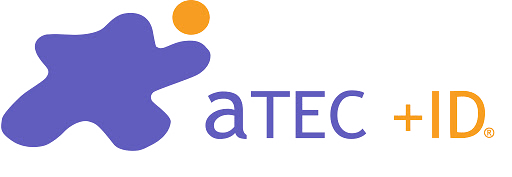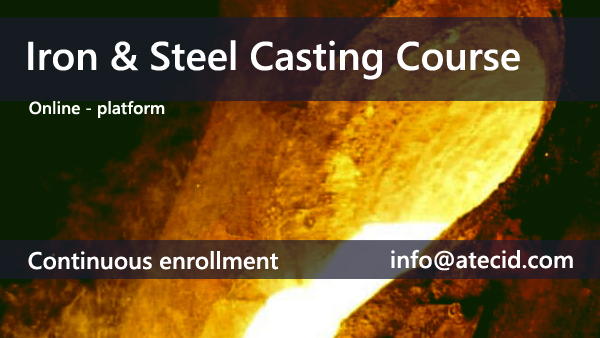The contents of this online course offer a good balance between scientific and technological knowledge, and how this knowledge is transferred in its real and practical implementation in a foundry (induction furnace, electric arc furnace + ladle or cupola refining, and others). ), and mold casting, showing practical cases.
This course is of interest to both junior and senior professionals from the foundry itself, management, commercials and foundries consumers. Also from sectors of machine construction, automobile, wind, etc, who find an opportunity to acquire new knowledge and points of view on technical issues and new methods and ideas on their particular cases. It may also be of interest to management or leadership functions, for whom it is important to know what a foundry is, what manufacturing is like, and the areas of activity and knowledge of a foundry and quality, facilities, positions and functions, Lean management , continuous improvement, new projects, etc, and even analyze the costs.
The course takes place on our online training platform. This does not mean that quality is lost, quite the contrary, this modality is ideal for this type of content in which it is necessary to understand the logic of the process and metallurgy, since it allows progress through the course, adapted to each person.
The structure of the course is as follows:
Module 1: Vision of the Foundry
In the first place, and in order to obtain a vision of the sector and its global socioeconomic environment, and of the type of industrial installations, an exhibition of the state of the foundry sector is made as part of the steel sector, on a global basis, in terms of market and production, to understand the strategic and evolutionary vision of the same and what the foundry is like as a general process, and of the iron and steel that are obtained. With this, the participant will acquire a vision of the sector in its most important technical, industrial and business lines.
Module 2: EAF
EAF is understood as the melting furnace, although ladle refining is also an EAF. In this module, the study of this process is carried out in all its scope as a chemical process, installations and operations, focusing on each of the necessary operations and the details of the steel-slag interaction. The participant will be able to learn about the different aspects, about compositions, temperatures, process steps and issues that influence quality, productivity and costs, and how the melting process is linked with the preparation of refining. There are more and more EAFs dedicated to Foundry.
Module 3: Ladle Refining
The participant will obtain a detailed description of how the melting phase is linked with the refining or ladle refining phase, desulfurization, deoxidation, additions and alloying agents, decarburization, temperature, control of slag and inclusions, refractories, etc., and how casting is prepared. It shares concepts of chemical treatment and evolution with any of the following types of furnace/processes.
Module 4: Melting in induction furnace, and rotary furnaces
A good part of the melting is carried out in an induction furnace, and frequently has a previous rotary furnace to preheat and melt the raw materials or a part of them. Although very clean raw materials are used, the participant will know what this oven is like, combination possibilities, energy consumption, etc.
Module 5: The Cupola Furnace and Other Furnaces
The cupola is the most widespread furnace in the world, with its own characteristics and specific process, although with variants. The participant will be able to review all of this, the chemistry, energy efficiency, and obtain a certain vision of practices that other furnaces, crucibles, etc. use.
Module 6: Casting in molds
We wanted to clearly separate what it is to obtain the molten metal, from what is casting in molds, and the production of the molds. The participant will learn about very different molding practices, and how to obtain molds, how they are configured, what they are most suitable for, how the metal solidifies in the mold, surface quality, internal quality, etc., types of installations and operations.
This module is complemented with a chapter dedicated to alloys and treatments, and a chapter dedicated to Foundry 4.0 as a trend within what is known as industry 4.0.
Registrations and Price
This course is in English language, please ask if you need this course in another language,
- The price is 900 € per person (990 $)
- Payment must be made before starting the course
- You can download and fill the Registration Form
Payment can be made by bank transfer or a card, for your convenience please visit our online shop
The participant will receive a username and password to access the course on our training platform the same day it starts, or usually two days before the starting date.
It is necessary to have a PC or MAC computer, or a mobile device such as a tablet (much better than just an smartphone) with internet access to take the course.
The participant will receive a diploma or certificate at the end of the course, if requirements are met. To obtain a certificate of achievement, it will be necessary to have completed at least 75% of the contents and have passed 75% of the evaluation tests with a mark of 50%, and to obtain an attendance certificate it will be necessary to have completed 75% of the contents and have attended at least 25% of the planned course hours.
We appreciate and thank you for spreading the information about this course.
Below you can consult the documentation of the course:
Please access the course sheet



